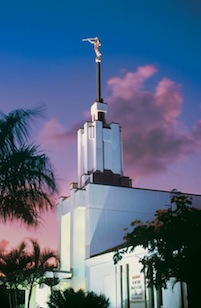 Even by the most conservative estimates, Tonga is the most intensely Mormon nation on Earth. The official estimate is that roughly 15 percent of Tonga’s population belongs to the Church of Jesus Christ of Latter-day Saints, but Mormons adherent place the figure much higher—typically around 32 percent, and sometimes even higher. This is par for the course in Polynesia, of course—of the ten nations with the highest concentrations of Mormons, six are in the South Pacific.
Even by the most conservative estimates, Tonga is the most intensely Mormon nation on Earth. The official estimate is that roughly 15 percent of Tonga’s population belongs to the Church of Jesus Christ of Latter-day Saints, but Mormons adherent place the figure much higher—typically around 32 percent, and sometimes even higher. This is par for the course in Polynesia, of course—of the ten nations with the highest concentrations of Mormons, six are in the South Pacific.
Part of the LDS Church’s success in Tonga is obviously due to tenacity of its missionaries, who first visited the kingdom in 1891. But there is another factor to consider, one that brings into question that nature of the conversion statistics: the fact that many Tongans adopt Mormonism for reasons that probably have less to do with spirituality than with bettering their family’s fortunes:
Assembly line Mormon churches (with their inevitable basketball courts) are popping up in villages all over Tonga, as the children of Israel convert in droves to be eligible for the free buildings, schools, sporting facilities, and children’s lunches. Many Tongans become “school Mormons,” joining as their children approach high school age and dropping out as they complete college in Hawaii. Unlike Cook Islanders and American Samoans, Tongans don’t have the free right of entry to a larger country, so church help in gaining a toehold in Honolulu or Salt Lake City is highly valued.
This doesn’t necessarily mean that the Mormons’ conversion strategy isn’t clever. Even if a sizable percentage of Tongan adherents only gravitate toward the Church for the benefits, there is a good chance that many of their children, having passed through Mormon schools, will become more genuinely devout than their parents. This is similar to what happened in Nagaland, where American Baptist missionaries opened primary schools beginning in the late 19th century, and now the North-East Indian province is among the most earnestly Christian corners of the world—though, granted, the Nagas do embrace a form of Christianity that is more than a little tinged with tribal traditions.
But bribery and religion do make for strange bedfellows, don’t they? It’s clear that the LDS Church takes great pride in its conversion numbers from Tonga, using them as proof that its message resonates the world over—even with those who might not have been particularly welcome in the Church prior to 1978. But winning souls through material inducements strikes me as undermining one of a religion’s key attributes: Its claim to offer an undeniable truth.
Is there something untoward about using bribery to attract converts, many of whose hearts are not truly changed by the proselytizers’ message?


tsg // Nov 17, 2010 at 11:57 am
While bribery and religion do indeed make strange bedfellows, I’d say that combination represents progress over the more time honored tradition of using violent coercion as a means of religion conversion.
The fact that most religions rely upon either sticks, carrots or both to win converts speaks volumes about the putative “undeniable truth” of their beliefs.
Brendan I. Koerner // Nov 17, 2010 at 12:02 pm
@tsg: Excellent point–free schooling is preferable to the Spanish Inquisition.
monkeyball // Nov 17, 2010 at 3:38 pm
If the Quakers proselytized like this, would the Tongans who drop in and drop out be considered “Friends with benefits”?
monkeyball // Nov 17, 2010 at 3:41 pm
@BIK: Nobody expects the free schooling!
Brendan I. Koerner // Nov 17, 2010 at 5:27 pm
@monkeyball: Cue the rim shots!